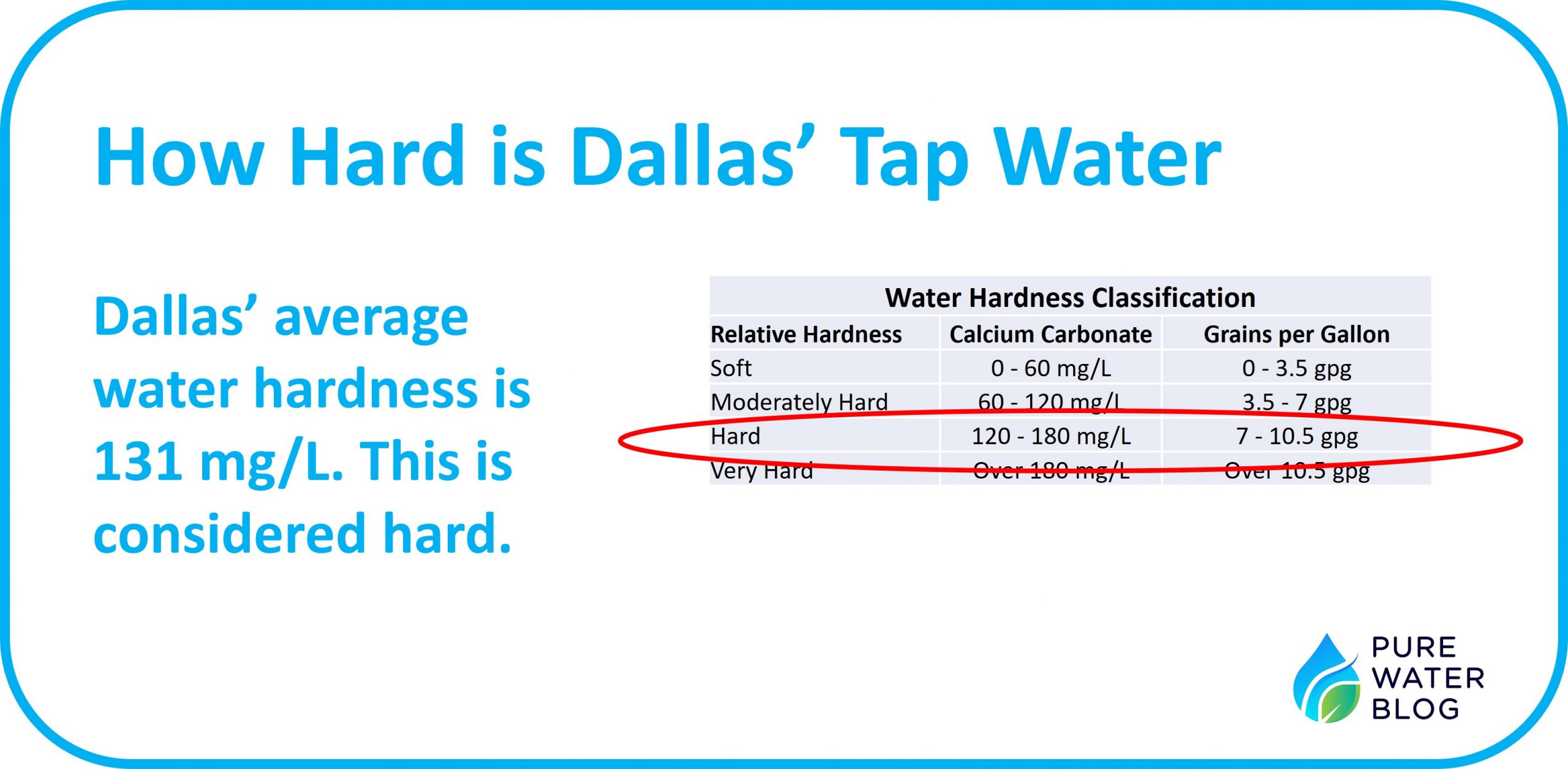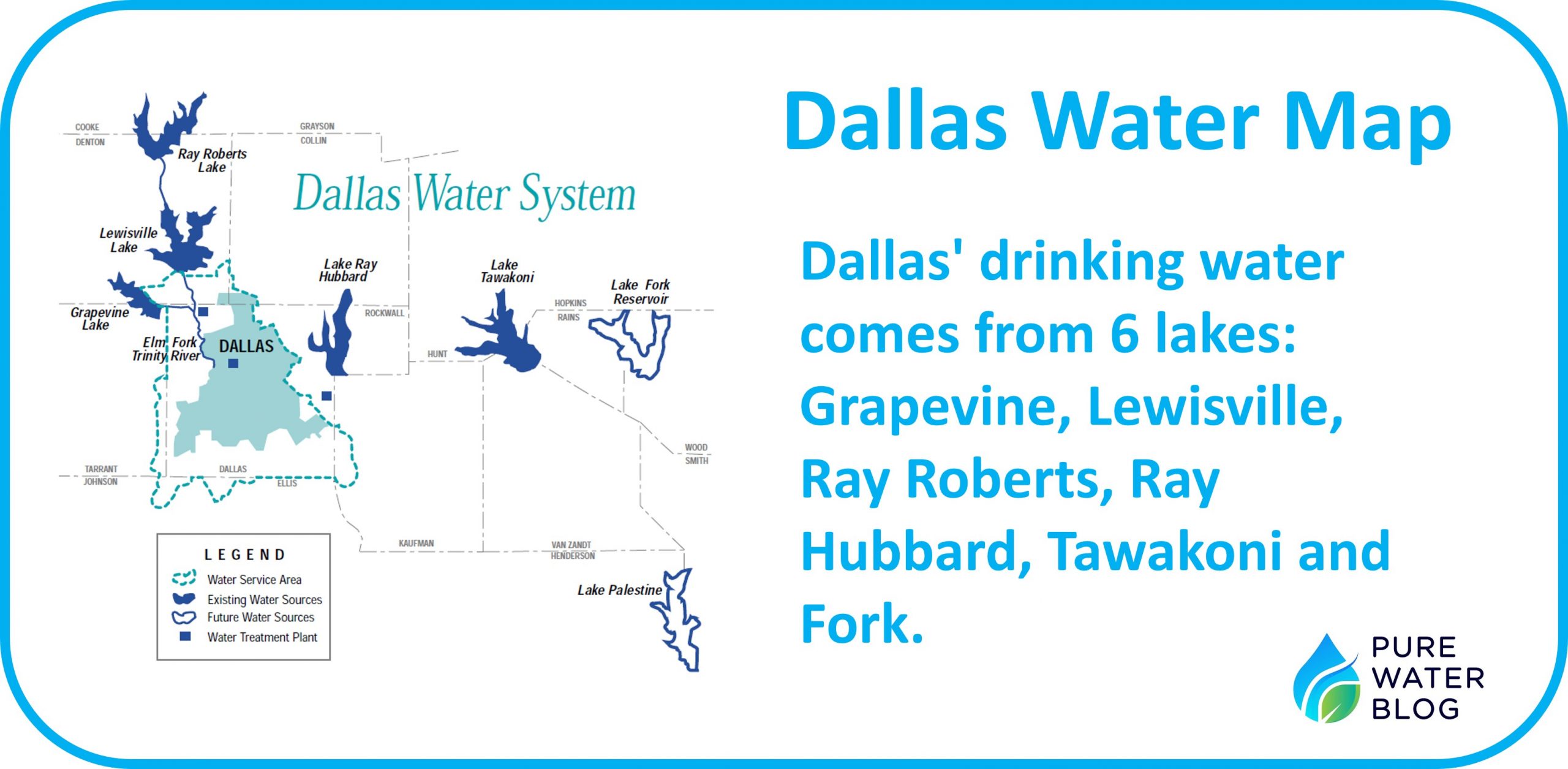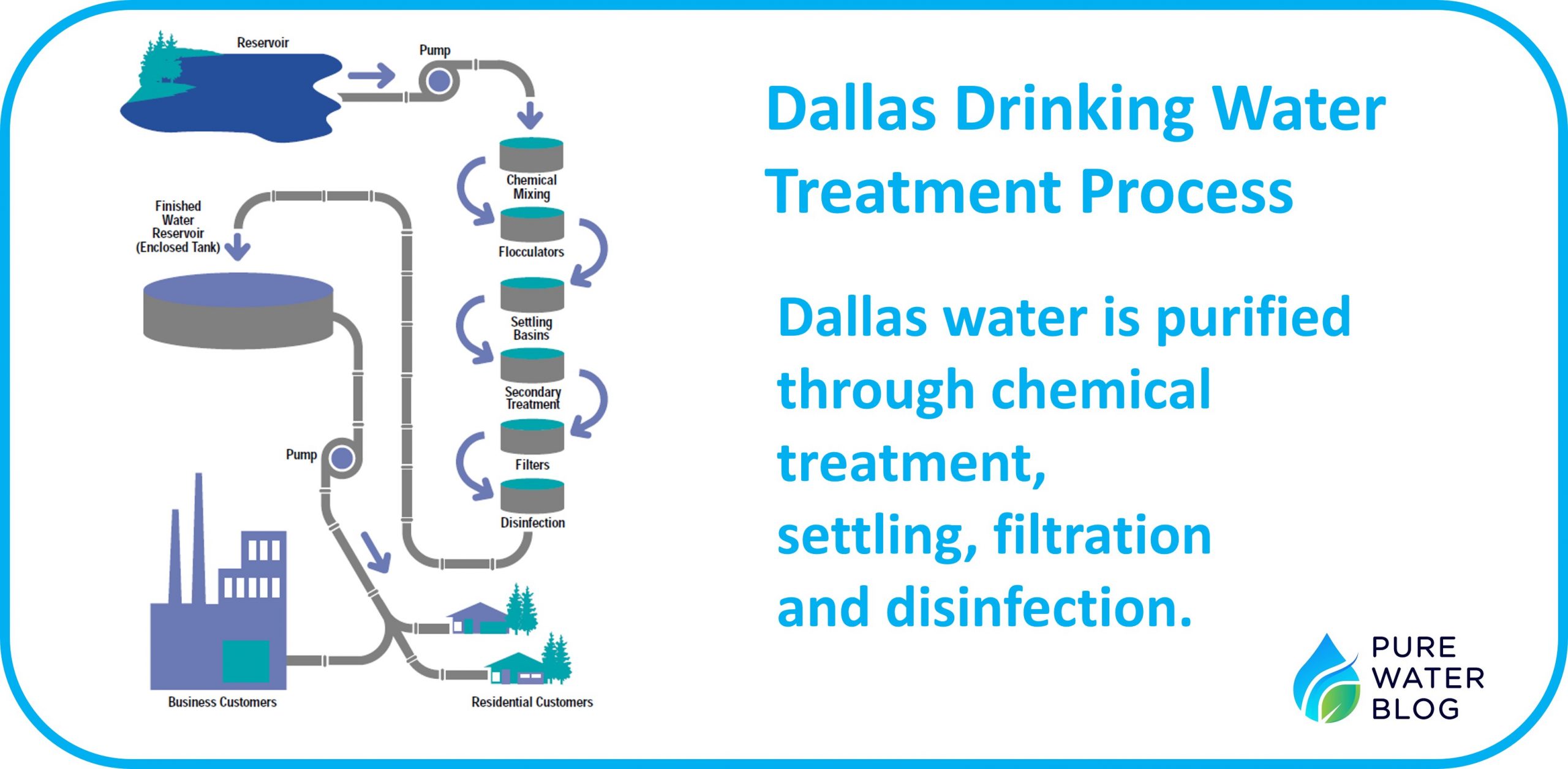If you live in Dallas or the surrounding areas, perhaps you’ve seen mineral buildup on your faucets or showerheads, or your skin and hair feel dry and itchy after showering. These are all signs of hard water, a common problem in many cities across the United States. But does Dallas have hard water?
Dallas has hard water. According to a recent report, Dallas water has an average water hardness of 131 ppm with a range of 108 to 179 ppm, which is considered hard.
In this article, we’ll answer that question and provide you with everything you need to know about hard water, its effects, and what you can do to solve the problem.
You may be interested in my article about water hardness in other cities.
Table of Contents
Does Dallas Have Hard Water?

Yes, Dallas has hard water. According to a recent report, Dallas water has a hardness of 131 milligrams per liter (mg/L). This is the same as parts per million (ppm), which is the standard measurement for water hardness. Converting to grains per gallon (gpg), Dallas’s water hardness is 7.6 gpg.
The United States Geological Survey (USGS) defines hard water as water that is between 120 and 180 ppm, which means that Dallas falls within this range.
The table below summarizes the water hardness in Dallas and the major cities and towns in Texas.
| City | Average Hardness Calcium Carbonate mg/L | Average Hardness Grains per Gallon |
| Dallas | 131 | 7.6 |
| Austin | 84.5 | 5 |
| Abilene | 284 | 16.7 |
| Allen | 146.5 | 8.6 |
| Arlington | 89.3 | 5.3 |
| Bedford | 107 | 6.3 |
| Brownsville | 185.7 | 10.9 |
| Bryan | 8 | 0.5 |
| Burleson | 140 | 8.2 |
| Cedar Park | 181 | 10.6 |
| College Station | 7.9 | 0.5 |
| Corpus Christi | 227 | 13.3 |
| Euless | 57.7 | 3.4 |
| Fort Worth | 140 | 8.2 |
| Frisco | 146.5 | 8.6 |
| Galveston | 200 | 11.7 |
| Garland | 161.5 | 9.5 |
| Grand Prairie | 132 | 7.8 |
| Grapevine | 112 | 6.6 |
| Houston | 135 | 7.9 |
| Irving | 135 | 7.9 |
| Keller | 140 | 8.2 |
| Leander | 175 | 10.3 |
| Lewisville | 114.6 | 6.8 |
| Little Elm | 146.5 | 8.6 |
| Longview | 59.6 | 3.5 |
| Lubbock | 243 | 14.3 |
| Mansfield | 99.8 | 5.9 |
| Mesquite | 146.5 | 8.6 |
| Midland | 500 | 29.3 |
| New Braunfels | 266.5 | 15.6 |
| North Richland Hills | 134.5 | 7.9 |
| Pflugerville | 118 | 7 |
| Plano | 146.5 | 8.6 |
| Richardson | 146.5 | 8.6 |
| Round Rock | 187 | 11 |
| Rowlett | 146.5 | 8.6 |
| San Angelo | 288 | 16.9 |
| San Marcos | 260 | 15.3 |
| Sugar Land | 143 | 8.4 |
| Temple | 149 | 8.8 |
| Texas City | 200 | 11.7 |
| Victoria | 226 | 13.3 |
| Wylie | 146.5 | 8.6 |
Learn about water hardness in these cities:
Does Austin Have Hard Water
Does San Antonio have hard water?
Texas Water Hardness
Texas is a large state with a diverse geography and climate, and it gets its drinking water from a variety of sources, including surface water and groundwater.
The water hardness in Texas varies depending on the region. According to the Texas Water Development Board, the water hardness ranges from less than 50 milligrams per liter (mg/L) to more than 500 mg/L in some areas. Generally, the eastern part of Texas has softer water, while the western part has harder water.
The cities in Texas with the hardest water tend to be in the western part of the state, such as El Paso, Midland, and Odessa. In these cities, the water hardness can be as high as 500 mg/L or more.
On the other hand, the cities in the eastern part of Texas, such as Houston and Dallas, tend to have water with a lower hardness, ranging from 50 to 150 mg/L.
What is Hard Water?
Hard water is water that contains a high level of minerals such as calcium, magnesium, and iron. These minerals dissolve in water as it flows through rock formations and soil before reaching our water sources. The amount of dissolved minerals in water is measured in parts per million (ppm) or milligrams per liter (mg/L), with water that has a ppm or mg/L above 120 classified as hard water.
What are the problems caused by hard water?
Hard water can cause several problems, both for your home and your health. One of the most common problems is the buildup of minerals on plumbing fixtures, such as showerheads, faucets, and pipes. This buildup can reduce water flow, cause clogs, and eventually lead to the need for costly repairs or replacement of plumbing fixtures.
Hard water can also cause problems for your skin and hair. The minerals in hard water can leave a residue on your skin and hair, which can make them feel dry and itchy. This residue can also make it difficult to lather soap and shampoo, which can lead to using more product than necessary.
Additionally, hard water can impact the effectiveness of your household cleaning products. The minerals in hard water can react with the cleaning agents and create a film on surfaces that is difficult to remove. This can result in spending more time and money on cleaning, and it may also lead to the need for more frequent replacement of appliances such as dishwashers and washing machines.
Who is Dallas’s Water Provider?
The water provider for the city of Dallas is Dallas Water Utilities (DWU). DWU is a city-owned utility that manages the treatment and delivery of water to more than 1.4 million residents and businesses in the Dallas area.
DWU sources its water from a variety of sources, including surface water from lakes and rivers, and groundwater from aquifers. The utility also operates multiple treatment plants that use a variety of treatment methods to ensure that the water is safe to drink and meets all regulatory standards.
Where does Dallas water come from?

Dallas Water Utilities sources its water from a variety of sources, including surface water and groundwater. The majority of the city’s water supply comes from 6 lakes:
- Lake Grapevine
- Lake Lewisville
- Lake Ray Roberts
- Lake Ray Hubbard
- Lake Tawakoni
- Lake Fork
In addition to reservoirs, DWU also sources water from aquifers, which are underground water sources. The utility operates several well fields that tap into these aquifers, and the water is then treated and delivered to customers just like the surface water.
Is Dallas’s tap water treated?

Dallas Water Utilities uses a variety of treatment methods to remove impurities and contaminants from the water. Here are some of the treatment methods that DWU uses:
- Coagulation and Flocculation: This process involves adding chemicals to the water to help the impurities clump together and form larger particles that can be more easily removed.
- Sedimentation: Once the impurities have been clumped together, the water is allowed to sit in a large tank, where the heavier particles settle to the bottom and are removed.
- Filtration: The water is then passed through filters, which remove any remaining impurities.
- Disinfection: To kill any remaining bacteria or viruses, the water is treated with chemicals such as chlorine or chloramine.
- pH Adjustment: The pH of the water may be adjusted to ensure that it is not too acidic or basic, which could affect the taste or cause damage to pipes.
- Fluoridation: In some cases, fluoride may be added to the water to help strengthen teeth and prevent tooth decay.
Quality of Dallas tap water
The quality of Dallas tap water is closely monitored and regulated to ensure that it meets all federal and state drinking water standards. Dallas Water Utilities conducts regular tests on the water supply to check for contaminants and impurities, and the results are made public through annual water quality reports.
According to the most recent report, Dallas tap water meets or exceeds all federal and state drinking water standards. The water is free from harmful bacteria, viruses, and parasites, and has low levels of contaminants such as lead, copper, and disinfection byproducts.
In addition to meeting regulatory standards, Dallas Water Utilities also strives to provide high-quality water that is aesthetically pleasing and palatable. The water is treated to remove any taste, odor, or color that could be unpleasant, and pH adjustments are made to ensure that the water is not too acidic or basic.
How much water does Dallas use each year?
Dallas is one of the largest cities in the United States, and as such, it requires a significant amount of water to meet the needs of its residents and businesses. According to Dallas Water Utilities, the city uses an average of 265 million gallons of water per day, which translates to approximately 97 billion gallons of water each year.
The majority of this water is used for residential purposes, such as drinking, cooking, bathing, and irrigation. However, a significant portion is also used for commercial and industrial purposes, including manufacturing, energy production, and food processing.
Texas water use and consumption statistics
Texas is the second-largest state in the United States and has a population of over 29 million people. With such a large population, it is not surprising that Texas is also one of the largest water users in the country. Here are some statistics on Texas water use and consumption:
- Texas uses an average of 16.4 million acre-feet of water per year. This is equivalent to about 5.3 trillion gallons of water.
- The majority of Texas water use is for irrigation purposes, with about 60% of water being used for agriculture.
- Municipal and industrial use account for the remaining 40% of water use in Texas. This includes drinking water, industrial processes, and commercial activities.
- The residential sector is the largest municipal user of water, accounting for about 25% of total water use.
- Despite its high water usage, Texas has made significant progress in water conservation in recent years. From 2010 to 2015, total water use in the state decreased by 16%.
- Texas has also implemented a number of programs and incentives to promote water conservation, such as drought-resistant landscaping and efficient irrigation practices.
What Can I Do About Hardness in My Water?
If you are concerned about the hardness of your water, there are several steps you can take to address the issue. Here are some options to consider:
- Install a water softener: A water softener is a device that removes minerals from your water, reducing its hardness. Water softeners use a process called ion exchange to remove calcium and magnesium ions and replace them with sodium or potassium ions.
- Use a descaler: A descaler is a device that uses electromagnetic waves to alter the structure of minerals in your water, preventing them from forming scale. Descalers are an alternative to water softeners and are often used in situations where sodium or potassium is not desired in the water.
- Use a reverse osmosis filtration system: Filtration systems can remove minerals, sediment, and other impurities from your water. While they are not specifically designed to address water hardness, they can help improve the overall quality of your water.
Conclusion
The quality of drinking water is an important concern for homeowners, and understanding the quality of the water in your area is essential for ensuring the safety and well-being of you and your family. In Dallas, the tap water is considered hard.
By taking steps to address water hardness, such as installing a water softener or using a RO filtration system, homeowners can improve the quality of their drinking water and prevent issues caused by hard water.

